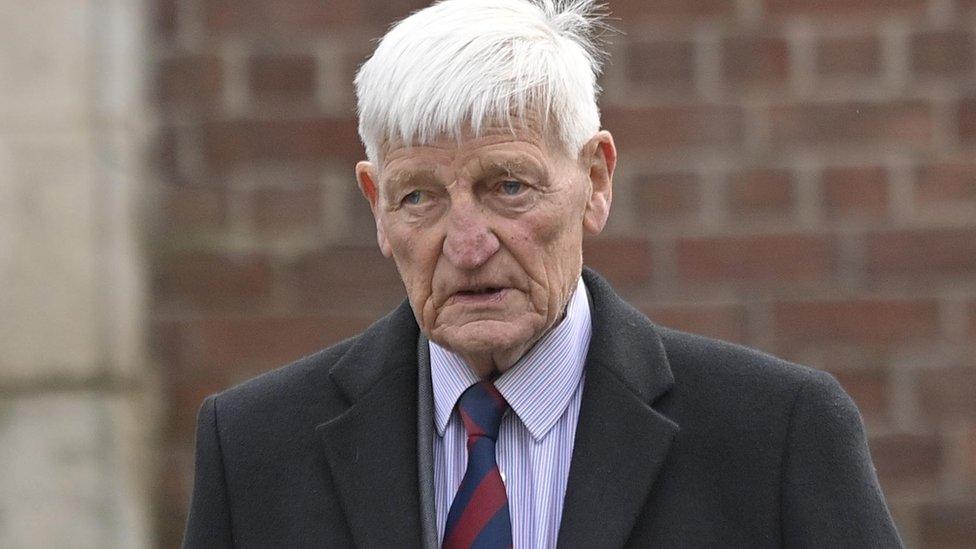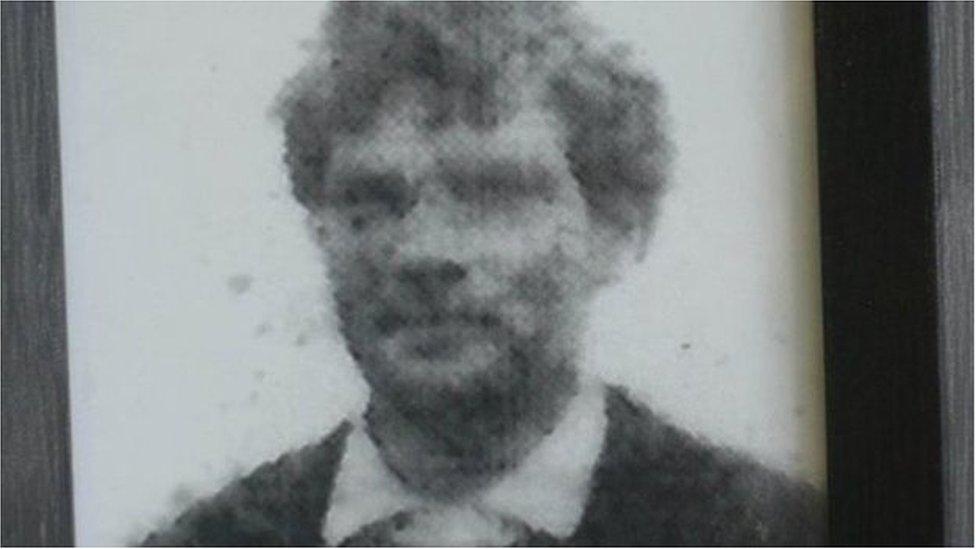Dennis Hutchings: Trial was in public interest, say prosecutors
- Published

Dennis Hutchings, 80, denied attempting to murder and cause grievous bodily harm to John Pat Cunningham
The decision to prosecute a former soldier over a fatal shooting during Northern Ireland's Troubles was in the public interest, prosecutors have said.
Dennis Hutchings, 80, from Cawsand in Cornwall, died in Belfast on Monday.
He had denied attempting to murder and cause grievous bodily harm to John Pat Cunningham.
The Cunningham family said they "wish to acknowledge that this is a difficult time for his family and they should be given time to grieve".
Mr Cunningham, 27, was shot in the back as he ran from an Army patrol near Benburb, County Tyrone, in 1974.
"When the time is judged appropriate, the family will respond in more detail to the issues surrounding the prosecution of Dennis Hutchings," they said in a statement.
"We respectfully remind the public of the facts that were pronounced at the trial, which were uncontested."
'It was a bloody war'
Speaking before the trial got under way, Mr Hutchings told the BBC he felt ex-soldiers were being used as "cannon fodder" by politicians.
Mr Hutchings was interviewed earlier in October, shortly before his death, by the BBC's Ireland correspondent Emma Vardy.
He said that former soldiers were being unfairly reinvestigated for their actions because records were kept by the military on soldiers' activities.
"Everything a soldier does from the minute a round is fired, it's logged, on the radio, it's logged in the control room.
"Talking abut the other side, the terrorist sides, there are no records."
He added: "It was a bloody war between two sides, and we were stuck in the middle, it was my job when I was here to try and keep the peace, try and protect people."
Mr Hutchings' solicitor, Philip Barden, who had worked with him for 10 years, has called on the government to "halt the historic prosecution of veterans".
"I was with him on Monday shortly before he passed away," he added.
Court adjourned after Covid diagnosis
"I hope that the government will now enact a statute of limitation that will end the shameful pursuit of Army veterans in Northern Ireland.
"This should be known as Dennis' Law as it is the cause that he fought and died for."
The Deputy Director of Public Prosecutions in Northern Ireland, Michael Agnew, said the file submitted to the PPS by police "included certain evidence not previously available".
You can read his full statement here, external.
The non-jury trial had been sitting at Belfast Crown Court for three days a week to allow Mr Hutchings, who had been suffering from kidney disease, to receive dialysis treatment.
It was adjourned on Monday after the court heard he had tested positive for Covid-19. He died in the Mater Hospital in Belfast later that afternoon.

John Pat Cunningham was 27 at the time of his death but had a mental age of between six and 10
Unionist politicians have criticised the decision to prosecute Mr Hutchings.
Democratic Unionist Party leader Sir Jeffrey Donaldson said there were "serious questions around those who made the decision that Dennis should stand trial once more".
"Whilst understanding the desire of the Cunningham family for justice, we have consistently challenged those in legal authority who insisted that Dennis stand trial again.
"He was an 80-year-old veteran, in ill-health on dialysis and there was a lack of compelling new evidence."
Ulster Unionist Party leader Doug Beattie said the decision by the Public Prosecution Service to proceed with a trial given Mr Hutchings' ill-health demanded an independent review.
"The questions must be asked, did this trial hasten Mr Hutchings' death and did it meet the evidential and public interest tests?" he said.
Serious charge
The deputy director of public prosecutions said the PPS commenced proceedings against Mr Hutchings in 2015 after "a careful consideration of a wide range of issues, including the strength of evidence against him and the relevant public interest considerations".
"The PPS decision to prosecute Mr Hutchings for attempted murder was taken after an impartial and independent application of the Test for Prosecution," Michael Agnew added.
"Whilst a review of a previous 'no prosecution' decision does not require the existence of new evidence, the police investigation in this case resulted in a file being submitted to the PPS which included certain evidence not previously available.
"In the course of the proceedings there were rulings by High Court judges that the evidence was sufficient to put Mr Hutchings on trial and also that the proceedings were not an abuse of process. "


Dennis Hutchings' supporters had made an issue of his age and ill-health during a long campaign against his prosecution.
Legal attempts to have his case thrown out failed before it reached trial stage.
His death will very likely reopen arguments around legacy prosecutions.
The government is proposing to end all future investigations and court cases related to Troubles incidents prior to the 1998 Good Friday Agreement.
Part of its reasoning is to protect veterans.
This development leaves just one other veteran facing trial, David Holden, who is accused of the manslaughter of Aidan McAnespie in 1988.
All other recent cases involving former soldiers have collapsed.

Mr Agnew said the PPS recognised concerns "in some quarters" in relation to the decision to prosecute.
"However, where a charge is as serious as attempted murder, it will generally be in the public interest to prosecute."
Northern Ireland Veterans Commissioner Danny Kinahan said he was "incredibly sad to learn of the passing" of Mr Hutchings.
"It has to be recognised that we need a fair, balanced and proportionate system that has been promised," he said.
Prime Minister Boris Johnson's official spokesman said "sincere condolences go to the family, friends and loved ones of Dennis Hutchings".
"The Ministry of Defence supported Mr Hutchings throughout his trial with legal representation and pastoral care, and that will continue to be offered to his family," he said.
"This tragic case highlights that the criminal justice approach broadly is no longer working and that is why we are committed to introducing new legislation to bring greater certainty for all communities, including the veterans and families of victims."
Sinn Féin's Michelle O'Neill said while she was conscious of Mr Hutchings' grieving family, she was also thinking of the family of John Pat Cunningham, who had been campaigning for 47 years.
"They shouldn't have had to wait this long," she said.
"My message today would be very straightforward to the British government - get on with implementing the Stormont House Agreement, external, find a way to allow families to have closure, to deal with the past in an adequate way.
"We agreed that many, many years ago in the Stormont House Agreement and the proposals they have put on the table at this moment in time are not acceptable to anyone."
Johnny Mercer, Plymouth MP and former veterans minister, who travelled to Northern Ireland with Dennis Hutchings, said he was devastated by his death.
"He was polite, kind, generous and strong. He was determined to prove his innocence," Mr Mercer said.
"I have huge admiration and respect for his resilience, and that of his family and his partner, Kim.
"In a nation that is quick to forget the price of the freedoms we enjoy, it was a privilege to be close to him, and I remain fiercely proud of him."
Open letter
Meanwhile, relatives of Troubles victims were in London on Tuesday lobbying politicians in their campaign against the government's legacy proposals
In July, Northern Ireland Secretary Brandon Lewis announced plans for a statute of limitations which would end all prosecutions related to the Troubles up to April 1998 and would apply to military veterans as well as ex-paramilitaries.
The proposals, which the prime minister said would allow Northern Ireland to "draw a line under the Troubles", would also end all legacy inquests and civil actions related to the conflict.
At Westminster on Tuesday afternoon, a cross-party group of MPs signed an open letter "totally rejecting" the UK government's proposals on how to deal with legacy issues.
It was signed by, among others, Shadow Secretary of State for Northern Ireland Louise Haigh, SDLP leader and Foyle MP Colum Eastwood and MP Joanna Cherry from the Scottish National Party.
Speaking outside Parliament, campaigner Raymond McCord, whose son Raymond Jr was murdered by loyalist paramilitaries in 1997, called on the prime minister "to take these proposals away" and said they have to be scrapped".
He said they had received "total support from every political party at Westminster except the Tories".